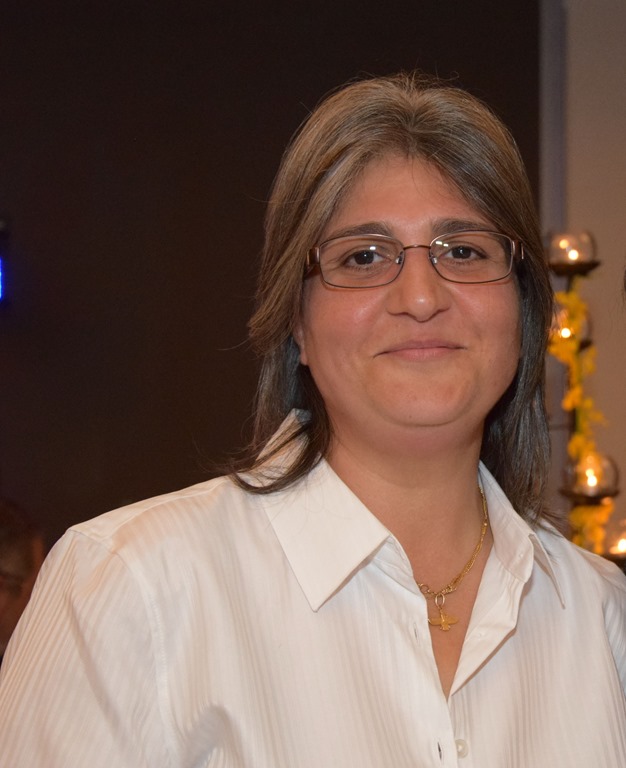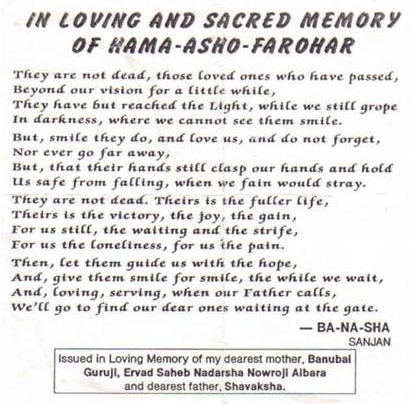Our first author in the Everyday Parsi 2020 series is Nergish Udwadia from Melbourne, Australia.
I was recently invited by Parsi to provide a write up on the significance of Muktad in my life. After quite some reflection, memories both coherent and remarkably clear began to emerge. Memories thought lost, though details still sketchy, musings of prayers and ceremonies magically reached the cortex and poured onto paper.
Ultimately for me, Muktad is synonymous with my dear mother and as such this perhaps is a story of 2 Everyday Parsis.
Below is my Muktad journey. . .
Muktad, what who??? As a child, growing up I never knew was Muktad was. I had no idea of the concept of Muktad. I never knew of the existence of a special ceremony wherein I could have any of my grand parents – from my mamaiji to my bapawa or indeed my sister “visiting” me here on earth, this mortal plane of existence that we experience.
My reflections of childhood, my recollections growing up in Bombay seem to lack detailed clarity as far as Muktad and indeed other prayers and rituals of the Parsi Zarathustrian faith are concerned, until the age of 12 years when we shifted from a place called Mazagaon to a place called Colaba.
Ritualistically not a very observant household, however my mother was a very religious person, prayers were her bedrock, which did govern her life providing comfort and solace. At times prayers were her life, her sole companion. A believer who did try to inculcate within me the importance of prayers. Not that growing up I prayed much or even appreciated the simplest and most reverent of all prayers – the Yatha Ahu and Ashem Vohu.

So early on Muktad and Gathas days were to a large extent not something I remember growing up with. However during my teens I did realise the Muktad days were a particular poignant time for my mum.
A special Ses that came out of our small display cabinet, scrupulously cleaned until it gleamed along with all it’s many implements, furious cleaning of the home, changing all the curtains, sofa covers, airing out, the activities seemed to be endless and almost frenetic around August.
The fruits, the papri, the malido, the rotli, the daraam were eagerly anticipated!! These were the highlights of the mysterious annual event called the Muktad. Prayers, dressing up, visiting the meticulously washed and cleaned Agiyaris and Atash Behrams, the heavenly fire, offerings of sukhar, lighting a divo, seeing the myriad rows of gleaming silver vases with the most beautiful floral arrangements I had ever seen, Muktad was a time that evoked a wonderful sense of grace and beauty.
Flowers and fragrance filled the corridors of the many hallowed halls of worship. Not knowing much about the occasion, nevertheless soaking it all in and not wanting to leave. Fortunately after the obligatory Kusti prayers and Paagae Parao, I was allowed to sit on my own and often finding a spot directly facing the fire, mesmerised by the leaping dancing flames with the Sukhar Loban fragrance enveloping and soothing.
Muktad seemed to be a very solemn time for most people praying. I also remember the Muktad days were of a much longer duration than the current observance. As I watched I realised Muktad was a time of piety and observance of many prayers for departed souls. There appeared to be a lot of tears and sadness surrounding these holiest of days. I felt these were days that had to be spent in remembering perhaps with regret, with repentance of human frailties, of words left unspoken. It was curious, but nevertheless not questioning and simply accepting this was what Muktad seemed to be all about, not realising Muktad was equally about the living as much as it was about the departed souls.
Fast forward to life down under, Australia.
Transplanted into another world and with a very naïve outlook, it took time to adjust to a new set of rules. Religion, I had to figure it out now on my own. Melbourne had a close, friendly and welcoming community. Not having a place of worship, I initially felt free of the requirement of prayers. Little was I to know that the thirst I had, the inquisitive curiosity I had as a teen and which had at one point made me contact religious scholars at Brown University in the hope of learning about my religion was simply dormant, waiting for a spark to reignite, to resurface.
There were no Muktad ceremonies and there were very few opportunities for nurturing my faith, externally. However life has a way of intervening, often with a jolt, providing an impetus to look within. My dear father’s passing was one such occasion. When within a couple of years my dear mother also passed away, I knew I had to attend mum’s first Muktad ceremony. Not simply because I knew she would have wanted me to but because I felt I needed to. Having passed away very suddenly just a few months ago, my grief over mum’s passing was still very raw during the Muktad prayers.
Memories of Muktad ceremonies of years gone past came flooding as I spent most of my time at the Agiyari in the most beautiful of surrounds. How did I survive without these ceremonies and for so many years of my life?? It was a very solemn occasion but as I contemplated amidst all the sadness, all the tears and all the rituals and prayers I actually began to feel a sense of calm, a tranquillity that I had not felt, sitting there amidst all the chanting, lost in thought observing the fire. And again yearning for my religion, I realised I needed my faith more than ever. These Muktad ceremonies were the catalyst for reigniting my search for my religion.
Muktad days for me now are a very personal obligation, a debt of gratitude, not just to the many familial souls but mainly to my dear parents. Theirs was not an easy life, nor one of affluence or luxury. When I look back objectively, I realise that despite all the trials and tribulations of life they endured, despite the monetary lack and my torrid childhood, my parents did the very best they could in the circumstance that life dealt them. So my prayers often are an appreciation of life while giving thanks, none more so then during the holy Muktad days.
Fast forwarding to today.
As I type this up, I find myself once again preparing for Muktad, which commence from Thursday. I know now that Muktad though a holy time, is not to reflect upon with regret or sorrow. Yes at these times I miss my parents the most but I have learnt and appreciate that my life is the richer for having known them and that I want them along with all who have touched my life to visit joyously. There is no trepidation, no longer doubting my faith. I look forward to the daily Satum prayers, the fruits and flowers along with preparing a few simple dishes for all to partake. The burning of incense and the divo, the fragrant Sukhar Loban wafting throughout, providing a happy surround. Welcome to my humble home and may your blessings continue to guide.
Ushta Te!!
I offer below a poem that I came upon, as if by divine intervention, when my dear mum passed away. It’s sentiment still echoes. . .

______________________________________________________________________________
Born and brought up in Bombay (Mumbai), Melbourne is home. Having served as President of the local Zoroastrian association over many years, Nergish now volunteers with various multi cultural and multi faith networks, providing counsel as well as a hands on approach on various issues. Her love of animals, especially dogs is innate and sees her often donating and adopting dogs from rescue shelters. She continues to seek out answers about her Zarathustrian religion and faith, continuing to attempt to translate the learnings to everyday life and living.
